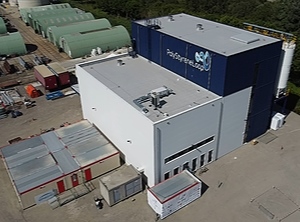POLYSTYRENELOOP
Plant for industrial EPS recycling now in regular operation / Initial capacity of 3,000 t/y
The first industrial plant for recycling EPS insulation materials from demolition and refurbishment work has gone into regular operation. “It was a hard piece of work to make the plant fit for this,” says Holger Lübke, the managing director of construction supplier Karl Bachl Kunststoffverarbeitung (Röhrnbach, Germany; www.bachl.de). His company, together with Rygol Dämmstoffe (Painten, Germany; www.rygol.de) and Brohlburg Dämmstoff- und Recyclingwerke (Andernach, Germany; www.brohlburg.com), operates the German EPS Converters Group (GEC), which last year saved the Dutch plant of PolyStyreneLoop (PSLoop) from insolvency.
 The plant in Terneuzen: Industrial recycling of EPS insulation materials containing HBCD has begun (Photo: IVH) |
A sum of EUR 17 mn was invested in developing the plant in Terneuzen, the Netherlands. The project was supported by partners from business and politics as well as with funding from the European Union. “Because the public interest in an industry solution was and is great,” explains Guido Brohlburg, head of the eponymous company.
Related: Final results of chemical reclaim project on depolymerising PS back to SM
A year before being rescued from insolvency, industry association PolyStyreneLoop had succeeded in recycling EPS insulation material containing hexabromocyclododecane (HBCD) flame retardant for the first time.
HBCD was used as a flame retardant in foam insulation boards from the 1960s until its use was banned in 2016. The industry switched to other flame retardants. But the ban meant that several thousand tonnes of PS waste containing HBCD could no longer be recycled as usual.
This gap is now filled by the new plant in Terneuzen, which recycles PS and bromine through a mechanical recycling process. The initial capacity is 3,000 t/y, with a target capacity of 8,000 t/y for the maximum expansion stage.
19.06.2023 Plasteurope.com [252957-0]
Published on 19.06.2023

 German version of this article...
German version of this article...